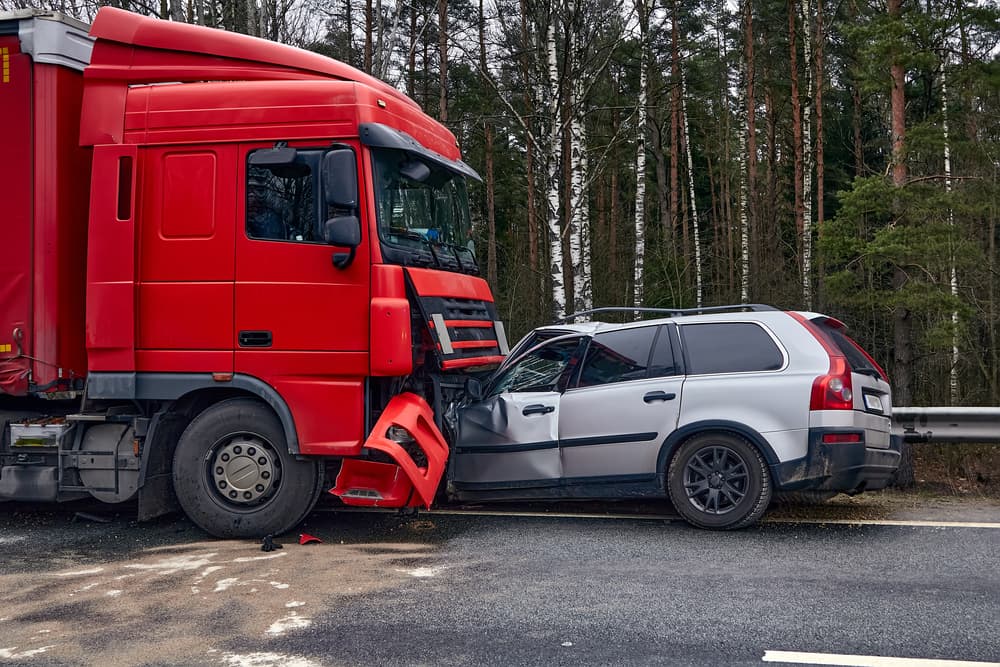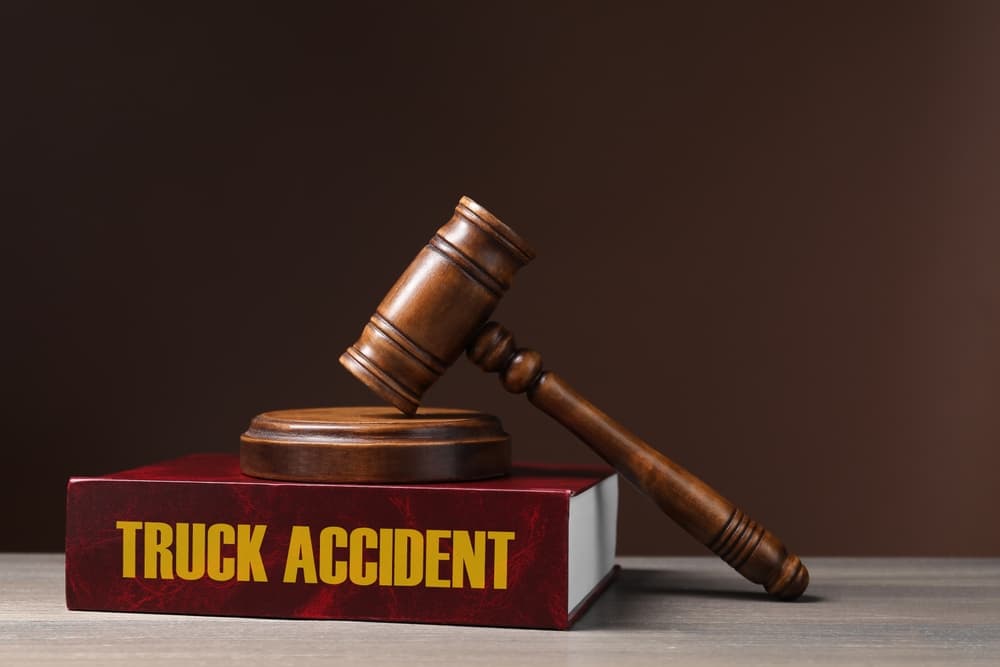Head-On Truck Collisions
When a truck slams into another vehicle head-on, the results often leave families grieving or survivors struggling with life-changing injuries. People involved in these crashes frequently need months or even years of medical care, rehabilitation, and financial adjustments. Those who endured head-on truck collisions caused by another driver may feel overwhelmed by the weight of medical bills and lost income while also managing the emotional burden of such a traumatic event.
Having a skilled truck accident lawyer helps families protect their rights, build strong claims, and pursue accountability from trucking companies, drivers, and insurers. If you or someone you love suffered injuries or lost their life in a head-on collision with a truck in Missouri, contacting a truck accident lawyer near you for a free consultation can provide the guidance you need.
Key Takeaways Involving Head-On Truck Collisions
- Head-on truck collisions are among the most devastating motor vehicle accidents due to the combined force and weight involved
- Driver fatigue, distracted driving, and impaired driving are leading causes of these catastrophic crashes
- Missouri follows comparative fault rules, allowing victims to recover damages even if partially at fault
- Immediate medical attention and legal representation are crucial for protecting your rights and maximizing compensation
- Trucking companies and drivers must comply with federal regulations, and violations can strengthen your case
What Makes Head-On Truck Collisions So Dangerous?
The violence of a head-on crash between a passenger car and a large truck often leaves destruction behind. Commercial trucks weigh up to 80,000 pounds when fully loaded, compared to an average passenger car at about 3,000 to 4,000 pounds. This weight imbalance increases the risk of catastrophic outcomes for people in smaller vehicles.
The Physics of Devastating Impact
A head-on collision involves two vehicles moving toward each other. The forces combine, creating a much greater impact than a rear-end or side-impact crash at similar speeds. Even at moderate speeds, the crash energy doubles because both vehicles contribute momentum. This sheer force explains why survivors often experience severe trauma.
Why Passenger Vehicle Occupants Face Greater Risk
Truck drivers sit higher off the ground and have the protection of a heavier frame. Passengers in smaller vehicles have less structural protection. The front end of a passenger car crumples under the pressure of the impact, sending shockwaves through the cabin and into the occupants. Safety features like airbags help, but they rarely provide enough protection against the weight of a semi-truck.
Common Types of Severe Injuries
Head-on truck accidents often result in:
- Traumatic brain injuries: A blow or jolt to the head that disrupts brain function, leading to memory problems, difficulty concentrating, or permanent disability.
- Spinal cord injuries: Damage that disrupts communication between the brain and body, sometimes causing paralysis or lifelong mobility challenges.
- Internal injuries: Damage to organs such as the lungs, liver, or spleen that may not appear immediately but can quickly become life-threatening.
- Multiple fractures: Bones in the arms, legs, ribs, or pelvis often break under crushing impact forces, requiring surgeries and extended recovery.
- Burn injuries: Fires or explosions after a collision can cause burns that need skin grafts and leave permanent scarring.
What Are the Leading Causes of Head-On Truck Accidents?
Truck crashes rarely happen without a cause. In many cases, driver decisions, company policies, or mechanical failures contribute.
Driver Fatigue and Hours of Service Violations
Truck drivers work long hours, and fatigue reduces alertness and slows reaction times. Federal Hours of Service regulations limit how long drivers can operate before resting. When companies push drivers to meet unrealistic deadlines, logbooks sometimes reveal violations. Fatigue impairs judgment similar to alcohol, making it a major cause of head-on truck collisions.
Distracted Driving and Cell Phone Use
Using a cell phone while driving takes attention away from the road. A driver looking at a screen for just a few seconds can cross the centerline into oncoming traffic. Distractions also include adjusting radios, eating, or using in-cab systems. For truck drivers, even minor lapses create catastrophic risks because of the truck’s size and weight.
Impaired Driving and Substance Abuse
Alcohol and drugs, including prescription medications, impair judgment and coordination. Trucking companies must follow strict drug and alcohol testing requirements. However, violations still occur. A single lapse in judgment by an impaired driver often leads to tragic consequences when operating an 18-wheeler.
Mechanical Failures and Poor Maintenance
Trucks must undergo regular inspections to stay roadworthy. Brake failures, tire blowouts, and steering problems can cause a truck to veer into opposing lanes. Maintenance records often reveal whether the trucking company neglected its duty to keep the vehicle safe.
Weather and Road Conditions
Rain, snow, ice, and fog reduce traction and visibility. Drivers must adjust their speed and allow greater stopping distances in poor weather. Failure to take reasonable precautions under these conditions can lead to liability if a crash occurs.
Each of these factors shows how preventable many head-on truck collisions truly are. When drivers ignore safety rules, companies cut corners on maintenance, or someone chooses distraction over caution, lives are put at risk.
Identifying the cause of a crash not only points to who should be held responsible but also helps build a stronger case for those injured or for families mourning the loss of a loved one.
How Does Missouri Law Handle Head-On Truck Collision Cases?
Missouri law governs how victims can pursue claims after truck accidents. Several key rules affect the outcome of these cases.
Missouri’s Comparative Fault System
Missouri follows a comparative fault rule. This means that even if a victim shares some responsibility for the accident, they can still recover damages. For example, if a jury finds a driver 20 percent at fault, they can still recover 80 percent of their losses.
Statute of Limitations for Truck Accident Claims
Victims must file personal injury lawsuits within five years of the crash. Wrongful death claims must be filed within three years. Missing these deadlines usually prevents victims from pursuing compensation.
Government-Owned Trucks and Liability
When a government-owned truck, such as one operated by a city, county, or state agency, causes a collision, different rules may apply. Claims against public entities often follow stricter procedures and shorter deadlines than those against private companies.
In Missouri, victims usually must file a notice of claim within a specific time frame before pursuing a lawsuit. These cases require careful attention to procedural rules to avoid losing the right to recover damages.
Required Insurance Coverage for Commercial Trucks
Missouri law requires commercial trucks to carry higher insurance limits than passenger vehicles. Federal law also imposes minimum coverage standards. This ensures greater resources are available to cover injuries and losses from serious truck accidents.
Federal Motor Carrier Safety Regulations
The Federal Motor Carrier Safety Administration (FMCSA) sets national rules for trucking companies and drivers. These include limits on driving hours, required inspections, and mandatory training. Evidence of FMCSA rule violations can strengthen a victim’s personal injury claim.
What Evidence Is Critical in Head-On Truck Collision Cases?
Building a strong case requires gathering detailed evidence from many sources.
Electronic Logging Devices and Driver Records
Most commercial trucks now have electronic logging devices (ELDs) that track driving hours. These records often show whether a driver exceeded legal limits or falsified logs.
Truck Maintenance and Inspection Records
Inspection and repair logs help reveal whether the truck was properly maintained. Missing records or skipped inspections can point to negligence by the trucking company.
Witness Statements and Accident Scene Documentation
Eyewitnesses provide valuable details about the crash. Photos, videos, and police reports from the accident scene also help document conditions and damage.
Expert Accident Reconstruction
Accident reconstruction specialists use skid marks, vehicle damage, and physics to recreate how the crash occurred. Their findings often play a major role in proving fault.
Medical Records and Injury Documentation
Medical documentation shows the extent of injuries and connects them directly to the accident. Treatment plans and long-term prognoses also demonstrate the financial impact of the crash.
What Types of Compensation Can Victims Recover?
Truck crash victims may pursue compensation for both economic and non-economic losses.
Economic Damages: Medical Bills and Lost Wages
Economic damages cover measurable financial losses. These include ambulance costs, hospital bills, rehabilitation, and lost wages if injuries prevent returning to work. Future losses, such as ongoing medical treatment or reduced earning capacity, may also be included.
Non-Economic Damages: Pain and Suffering
Non-economic damages address the human impact of an accident. These include physical pain, emotional distress, and the loss of enjoyment in life. Although harder to calculate, these damages recognize the deep personal effects of catastrophic injuries.
Punitive Damages in Cases of Gross Negligence
Missouri law allows punitive damages when a driver or company shows reckless disregard for safety. Examples include knowingly allowing a driver to operate without rest or ignoring serious mechanical problems. These damages aim to punish wrongful conduct and deter future violations.
Wrongful Death Damages for Surviving Family Members
When a head-on truck collision claims a life, surviving family members may file a wrongful death lawsuit. Damages may include funeral costs, loss of financial support, and loss of companionship. These claims hold negligent parties accountable for devastating losses.
How Our Attorneys Can Help
Truck accident cases require thorough preparation and aggressive advocacy. Our skilled attorneys at Cook, Barkett, Ponder & Wolz handle every step of the legal process, giving families time to focus on healing.
Immediate Investigation and Evidence Preservation
Quick action after a crash helps secure valuable evidence before it disappears. Our attorneys can send letters demanding preservation of logs, maintenance records, and electronic data.
Handling Insurance Company Communications
Insurance companies often attempt to minimize payouts. Our lawyers step in to manage all communications, preventing adjusters from pressuring victims into unfair settlements.
Working with Medical and Accident Reconstruction Experts
Our legal teams collaborate with medical specialists and reconstruction professionals to strengthen claims. Their testimony helps explain the full impact of the crash.
Negotiating Maximum Settlement Values
Our attorneys pursue fair settlement offers that reflect the full scope of losses. When insurers refuse to take responsibility, litigation becomes the next step.
Providing Aggressive Court Representation When Necessary
If insurers continue to deny accountability, we present the case in court. This includes questioning witnesses, presenting evidence, and advocating for the client before a jury.
Frequently Asked Questions About Missouri Truck Accident Claims
Can I still recover compensation if I was partially at fault for the accident?
Yes. Missouri’s comparative fault system allows recovery even if you share some responsibility. Your recovery may be reduced by your percentage of fault.
What if the truck driver was an independent contractor rather than a company employee?
Liability depends on the working relationship. Sometimes, trucking companies remain responsible if they control the work or fail to enforce safety standards. An attorney can help review contracts and company practices to determine liability.
How is compensation calculated in wrongful death cases involving head-on truck collisions?
Compensation may include funeral and burial expenses, lost financial support, and the loss of guidance or companionship. Courts look at both the economic and personal impact of losing a loved one.
What should I do immediately after a head-on collision with a commercial truck?
Seek medical attention right away, even if injuries seem minor. Call the police to document the accident. Take photos and gather witness contact information if possible. Contact a lawyer as soon as you can to protect your legal rights.
Contact Our Truck Accident Attorneys in Missouri Now

Truck Accident Attorney, Phillip J. Barkett
Time plays an important role in truck accident cases. Evidence can disappear, witnesses may move away, and insurance companies start building defenses quickly. Reaching out for a free consultation allows you to protect your rights while giving you space to focus on recovery.
The personal injury attorneys at Cook, Barkett, Ponder & Wolz have extensive experience handling serious truck accident claims. They understand how to investigate head-on truck collisions, hold negligent drivers and companies accountable, and pursue fair compensation for victims and families.
If you or a loved one suffered injuries or lost someone close in a truck collision, contact Cook, Barkett, Ponder & Wolz today for a free, no-obligation case evaluation.




